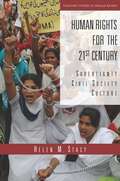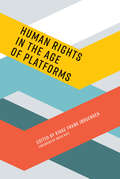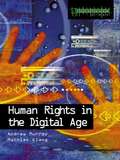- Table View
- List View
Human Rights for Refugees and Other Marginalised Persons: A Midrash Methodology
by Devorah WainerThis book provides a new framework for conducting qualitative research into Asylum Seeking Refugees based on Emmanuel Levinas’ ethic of the face-to-face encounter. The methodology originates in the term Midrash—a narrative form that exposes; investigates; searches. It reconceptualises encounters between Asylum Seeking Refugees and those researching their experiences in a manner that moves beyond the possibility of ‘Othering’ and the removal of ‘voice’ that can characterise research into refugees. This methodology allows a complex and rich multidimensional text, with heterogeneity of voices, experiences, and subjects. As a phenomenological method of research, the internal phenomena of the researcher—feeling, intuition, and personal perception—are legitimate sites of knowledge and understanding, and are not considered separate from the external, objectively observable world. While the researcher is not researching herself, she is also not separate from the research field and data. The Midrash methodology is an honest and explicit method of research designed to (re)invigorated the passion of academics and researchers.
Human Rights for the 21st Century
by Helen M. StacyIn an effort to defend the necessity of building international human rights institutions, Stacy (Stanford Law School) addresses three broad critiques of international human rights. In response to charges that international human rights is either powerless rhetoric in the face of national interests or perhaps an excuse for colonial or imperial projects that impinge on the sovereignty of nation-states, she argues that a new norm of sovereignty, "relational sovereignty," has emerged in the era of economic and communications globalization and that it requires the sovereign to care for the human rights of its citizens. Against those who argue that civil society is a better vehicle for promoting human rights than international law, she contends that law provides a structure for disagreement, claims, and judgments that can mediate disputes in ways that neither social nor political institutions are able to do. Finally, addressing those that worry about the challenges of cultural difference to universal standards of human rights, she proposes the creation of regional institutions that will be able to offer equilibrium between general international norms and particular cultures. Annotation ©2009 Book News, Inc. , Portland, OR (booknews. com)
Human Rights in Africa: Contemporary Debates and Struggles (Contemporary African Political Economy)
by Eunice N. SahleThis edited collection explores key human rights themes and situates them in the context of developments on the African continent. It examines critical debates in human rights bringing together conceptually and empirically rich contributions from leading thinkers in human rights and African studies. Drawing on scholarly insights from the fields of constitutional law, human rights, development, feminist studies, public health, and media studies, the volume contributes to scholarly debates on constitutionalism, the right to water, securitization of development, environmental and transitional justice, sexual rights, conflict and gender-based violence, the right to development, and China’s deepening role in Africa. Consequently, it makes an important scholarly intervention on timely issues pertaining to the African continent and beyond.
Human Rights in Business: Removal of Barriers to Access to Justice in the European Union
by Katerina Yiannibas Juan José Álvarez RubioThe capacity to abuse, or in general affect the enjoyment of human, labour and environmental rights has risen with the increased social and economic power that multinational companies wield in the global economy. At the same time, it appears that it is difficult to regulate the activities of multinational companies in such a way that they conform to international human, labour and environmental rights standards. This has partially to do with the organization of companies into groups of separate legal persons, incorporated in different states, as well as with the complexity of the corporate supply chain. Absent a business and human rights treaty, a more coherent legal and policy approach is required. Faced with the challenge of how to effectively access the right to remedy in the European Union for human rights abuses committed by EU companies in non-EU states, a diverse research consortium of academic and legal institutions was formed. The consortium, coordinated by the Globernance Institute for Democratic Governance, became the recipient of a 2013 Civil Justice Action Grant from the European Commission Directorate General for Justice. A mandate was thus issued for research, training and dissemination so as to bring visibility to the challenge posed and moreover, to provide some solutions for the removal of barriers to judicial and non-judicial remedy for victims of business-related human rights abuses in non-EU states. The project commenced in September 2014 and over the course of two years the consortium conducted research along four specific lines in parallel with various training sessions across EU Member States. The research conducted focused primarily on judicial remedies, both jurisdictional barriers and applicable law barriers; non-judicial remedies, both to company-based grievance. The results of this research endeavour make up the content of this report whose aim is to provide a scholarly foundation for policy proposals by identifying specific challenges relevant to access to justice in the European Union and to provide recommendations on how to remove legal and practical barriers so as to provide access to remedy for victims of business-related human rights abuses in non-EU states.
Human Rights in Child Protection: Implications For Professional Practice And Policy
by Asgeir Falch-Eriksen Elisabeth Backe-HansenThis open access book critically explores what child protection policy and professional practice would mean if practice was grounded in human rights standards. This book inspires a new direction in child protection research – one that critically assesses child protection policy and professional practice with regard to human rights in general, and the rights of the child in particular. Each chapter author seeks to approach the rights of the child from their own academic field of interest and through a comparative lens, making the research relevant across nation-state practices. The book is split into five parts to focus on the most important aspects of child protection. The first part explains the origins, aim, and scope of the book; the second part explores aspects of professionalism and organization through law and policy; and the third part discusses several key issues in child protection and professional practice in depth. The fourth part discusses selected areas of importance to child protection practices (low-impact in-house measures, public care in residential care and foster care respectively) and the fifth part provides an analytical summary of the book. Overall, it contributes to the present need for a more comprehensive academic debate regarding the rights of the child, and the supranational perspective this brings to child protection policy and practice across and within nation-states.
Human Rights in Crisis
by Alice BullardThis volume expands our understanding of the pursuit of human rights during the era of the War on Terror. The threat to human rights both in the United States and among detainees in US-governed detention facilities created a widely perceived crisis in human rights. This text explores the broad and complicated ramifications of crisis by looking comparatively at societies in the present era and looking back at the historical and legal foundations of human rights. Human Rights in Crisis contains an element of hope derived from a conviction that the pursuit of human rights happens on many fronts and in many ways around the globe; that a retreat from human rights in the United States does not necessarily signal a global retreat. The essays here include perspectives from History, Anthropology, and Legal Studies, with a resulting interdisciplinary portrait of the complexities of pursuing human rights in wartime.
Human Rights in European Criminal Law
by Stefano RuggeriThis book deals with human rights in European criminal law after the Lisbon Treaty. Doubtless the Lisbon Treaty has constituted a milestone in the development of European criminal justice. Not only has the reform following the Treaty given binding force to the EU Charter of Fundamental Rights, but furthermore it has paved the way for unprecedented forms of supranational legislation. In this scenario, the enforcement of individual rights in criminal matters has become a core goal of EU legislation. Alongside these developments, new interactions between national and supranational jurisprudences have emerged, which have significantly contributed to a human rights-oriented approach to European criminal law. The book analyses the main developments of this complex phenomenon from an interdisciplinary perspective. Criminal and procedural law, constitutional law and comparative law must thus be combined to achieve a full understanding of these developments and of their impact on national law.
Human Rights in History: The Care of the Witness
by Michal GivoniDuring the twentieth century, witnessing grew to be not just a widespread solution for coping with political atrocities but also an intricate problem. As the personal experience of victims, soldiers, and aid workers acquired unparalleled authority as a source of moral and political truth, the capacity to generate adequate testimonies based on this experience was repeatedly called into question. Michal Givoni's book follows the trail of the problems, torments, and crises that became commingled with witnessing to genocide, disaster, and war over the course of the twentieth century. By juxtaposing episodes of reflexive witnessing to the Great War, the Jewish Holocaust, and third world emergencies, The Care of the Witness explores the shifting roles and responsibilities of witnesses in history and the contribution that the troubles of witnessing made to the ethical consolidation of the witness as the leading figure of nongovernmental politics.
Human Rights in History: The Emergence of Humanitarian Intervention
by Fabian KloseHow should the international community react when a government transgresses humanitarian norms and violates the human rights of its own nationals? And where does the responsibility lie to protect people from such acts of violation? In a profound new study, Fabian Klose unites a team of leading scholars to investigate some of the most complex and controversial debates regarding the legitimacy of protecting humanitarian norms and universal human rights by non-violent and violent means. Charting the development of humanitarian intervention from its origins in the nineteenth century through to the present day, the book surveys the philosophical and legal rationales of enforcing humanitarian norms by military means, and how attitudes to military intervention on humanitarian grounds have changed over the course of three centuries. Drawing from a wide range of disciplines, the authors lend a fresh perspective to contemporary dilemmas using case studies from Europe, the United States, Africa and Asia.
Human Rights in India (Routledge Research in Human Rights Law)
by Satvinder JussThis volume presents an integrated collection of essays around the theme of India’s failure to grapple with the big questions of human rights protections affecting marginalized minority groups in the country’s recent rush to modernization. The book traverses a broad range of rights violations from: gender equality to sexual orientation, from judicial review of national security law to national security concerns, from water rights to forest rights of those in need, and from the persecution of Muslims in Gulberg to India’s parallel legal system of Lok Adalats to resolve disputes. It calls into question India’s claim to be a contemporary liberal democracy. The thesis is given added strength by the authors’ diverse perspectives which ultimately create a synergy that stimulates the thinking of the entire field of human rights, but in the context of a non-western country, thereby prompting many specialists in human rights to think in new ways about their research and the direction of the field, both in India and beyond. In an area that has been under-researched, the work will provide valuable guidance for new research ideas, experimental designs and analyses in key cutting-edge issues covered in this work, such as Acid Attacks or the right to protest against the ‘nuclear’ state in India.
Human Rights in Islamic Societies: Muslims and the Western Conception of Rights (Routledge Studies in Islam and Human Rights)
by Ahmed E. SouaiaiaThis book compares Islamic and Western ideas of human rights in order to ascertain which human rights, if any, can be considered universal. This is a profound topic with a rich history that is highly relevant within global politics and society today. The arguments in this book are formed by bringing William Talbott’s Which Rights Should Be Universal? (2005) and Abdulaziz Sachedina’s Islam and the Challenge of Human Rights (2014) into conversation. By bridging the gap between cultural relativists and moral universalists, this book seeks to offer a new model for the understanding of human rights. It contends that human rights abuses are outcomes of complex systems by design and/or by default. Therefore, it proposes that a rigorous systems-thinking approach will contribute to addressing the challenge of human rights. Engaging with Islamic and Western, historical and contemporary, and relativist and universalist thought, this book is a fresh take on a perennially important issue. As such, it will be a first-rate resource for any scholars working in religious studies, Islamic studies, Middle East studies, ethics, sociology, and law and religion.
Human Rights in Nigeria's External Relations in the Age of General Muhammadu Buhari and His Successors: Loving the Foreigner as Yourself
by Philip C. AkaUnder the Fourth Republic since 1999, the challenge Nigerian leaders face like never before is how to create a state that matches the expectations of their diverse peoples at home and abroad. Taking this proposition as starting point, this book advances proposals for a human-right policy, referred to alternately in the work as principled foreign policy, for Nigeria under the Fourth Republic, taking advantage of the inestimable opportunity afforded by General Muhammadu Buhari’s departure from the political scene on May 29, 2023, after the famine, domestically and externally, wrought by his two terms of office as President. It is a broad-ranging argument, draped in the less arcane constitutional vocabulary and material of human rights, for thoroughgoing reforms at home and abroad as the only antidote to the nation-building dilemmas Nigeria confronts in the first quarter of the twenty-first century. Buhari’s departure marks the end of military teleguidance of Nigerian politics under the Fourth Republic in the camouflage of democratic rule, a birthmark of remote control dating back to the first military intervention in the country in January 1966. These momentous events within Nigeria coincide with equally epoch-making developments in the UK, Nigeria’s former colonial overlord, with ripple effects in Nigeria, signified by the death of Queen Elizabeth II, after seven decades on the throne, and the emergence of Prince Charles as King of England. A new monarch in Britain adds to the opportunity that falls open for the reconfiguration of Nigeria’s external relations with ramifications for the application of human rights in those relations. Despite its known disabilities, Nigeria has the potential infrastructure, including its sizable population, to conduct a human-right policy, if its leaders rationalize the country’s resources more wisely.
Human Rights in Probation: Theory, Practice and Balance (Routledge Frontiers of Criminal Justice)
by Kyros HadjisergisExploring the application, theory, implications and socio-legal underpinnings of human rights in probation and associated offender management, this book examines the organisation and re-organization of the National Probation Service, from the introduction of the Human Rights Act (HRA) to the end of the Transforming Rehabilitation era.Outlining how the duties of probation officers are interpreted in light of the HRA, this book evaluates applicable case law as a means to exemplify and clarify the direct operation of human rights law in instances of potential human rights violations. Chapters also analyse the current and future infrastructure of probation to demonstrate challenges of awareness, implementation and compliance. Based on qualitative data analysed through a socio-legal lens and a human rights framework, themes explored include crime control and due process, and are reflective of the tensions and imbalances experienced between risk or public protection and human rights. The book also includes case studies of Serious Further Offences that have either shed light on the shortcomings in the area of human rights in probation or highlighted factors linked to human rights, including scapegoating, cumulative systemic failures, miscommunications and over-reliance on risk assessments. Finally, it provides clarity as to what the human rights duties of the Service are, what relevant laws apply alongside the HRA, and how these decisions affect risk and offender management.An important and timely study of probation in England and Wales, Human Rights in Probation will be of great interest to academics of probation, criminal justice, and human rights. It will also be of value to Probation officers (including trainees) and other practitioners working in offender management services.
Human Rights in Psychiatry: Prospects and Dilemmas of Abolishing Coercion in Mental Health Care
by Dirk RichterThe book describes the ethical lines of conflict, shows why coercion can no longer be justified and analyzes the consequences and dilemmas of a possible abolition of coercive measures in psychiatric care. The use of coercion in mental health care is one of the most controversial topics in psychiatric nursing and psychiatry. The conflict line centers around the UN-Convention in the Rights of People with Disabilities (CRPD). Advocates of the CRPD are pushing for the complete abolition of coercion while opponents see central medical and legal aspects of care for people with mental health problems at risk. Clinicians in conventional psychiatry, including many mental health nurses, primarily justify these measures because of the assumed benefits of coercion-associated care and with the argument that many people affected are unable to make appropriate decisions for their own health in a crisis situation. This argument also applies to human rights, for example by basing coercive measures in the event of suicidality on the right to life. Three central topics are developed in the book. First, it is shown that psychiatric coercion can no longer be justified because the current practice of psychiatric care does not meet the ethico-legal requirements for the use of coercion. Second, a human rights-based approach of psychiatric care is outlined, which is fundamentally based on the will and preferences of people with mental health problems. Third, the consequences and dilemmas are indicated, e.g., the issue of how to deal with suicidality or dementia without the use of coercion. This book is aimed to receive a specific attention from the psychiatric nursing community.
Human Rights in Turkey: Assaults on Human Dignity (Philosophy and Politics - Critical Explorations #15)
by Winston Langley Hasan AydinThe book provides the historical setting of Turkey related to the development of democracy, human rights issues, the treatment of cultural and ethnic minorities, and the short- and long-term consequences of the crackdown including impacts on individuals, institutions like education and the media, the criminal justice system, the economy, and Turkey’s standing in the international community. Since the foundation of the Republic of Turkey, the military and the media have been the main traditional powers of oppressive, secularist, and nationalist regimes in the country. After a period of initial reforms, rather than eliminating the structures of the authoritarian state, Recep Tayyip Erdoğan seized the levers of power and used them aggressively against his political enemies. He turned Turkey into a one-man regime after the failed coup attempt on July 15, 2016, and his actions included the widespread violation of human rights.This book tells the tale of the consequences of the measures taken after the failed coup attempt that have adversely impacted the development of democracy and human rights in Turkey, altering the nation’s course of history. Beginning with a State of Emergency that was declared in July of 2016, Turkey has moved to a more authoritarian state. Among the consequences of the actions taken have been imprisonment of hundreds of thousands, the shuttering of media, the dismissal of public employees, the dismissal of academics, jailed elected Kurdish politicians, and the misuse of the criminal justice to victimize the population. Adverse effects have included widespread violations of human rights, torture, and mistreatment of prisoners, false imprisonment, and the absence of the right to a fair trial. This book examines some of the thorniest questions of Turkish democratization and human rights, including the underlying reasons for the decay of democracy and what has happened as a result of this decay. Among these is a deterioration of the educational system, a reduction in economic stability, the absence of the rule of law and due process, a radical transformation of the country, and violations of universal human rights.Endorsements:As one who knows people who have been victimized by the authoritarian regime in Turkey, “Human Rights in Turkey” provides unique insights and perspectives on the changes that have befallen his wonderful country. It is truly insightful. David L. Carter, Ph.D., Michigan State UniversityHuman Rights in Turkey: Assaults on Human Dignity fills a major gap in contemporary political scholarship. Its elucidation of Turkey’s democratic backsliding into a one-man authoritarian regime is insightful and unique. Absolutely required reading for anyone who cares about this beautiful country, its wonderful people, and its uncertain future. Kati Piri, Member of the European Parliament and Delegation to the EU-Turkey Joint Parliamentary CommitteeAydin’s and Langley’s book addresses critical issues in a critical case. Turkey had been regarded as a rising democracy in a troubled region, but in recent years the country has experienced troubling signs of democratic erosion. Central to that decline is the precarious status of basic human rights of expression, association, religion, and due process. This book explores what has happened and how it affects individuals and the Turkish polity more broadly.John M. Carey, Ph.D.. Wentworth Professor in the Social Sciences, Dartmouth College, NH, USATurkey was once a poster-boy of the league of modernizing countries – a staunch ally of the West, an almost-democracy that would become better soon enough. It might even be the first Muslim country to join the European Union. That image now lies shattered under the erratic one-man-show of Tayyip Erdoğan. The police state reigns supreme, opposition is cowed, the courts are in shambles, and more journalists are jailed for their opinions than in any
Human Rights in War (International Human Rights)
by Damien RogersThis volume is the most comprehensive and up-to-date compilation of in-depth analyses on human rights violations committed in war. It offers myriad perspectives on the content and application of legal protections offered to civilians, including women, children and the elderly, and to others who are ‘no longer active in the fight.’ A series of carefully researched case studies illustrates the extent to which human rights violations occur in recent and current armed conflict, and signals the ways in which these violations are dealt with. Each of the contributing authors has been selected on the basis of their international academic reputation and/or professional standing within the human rights field. Given the alarming numbers of people harmed in recent and current armed conflict, this book will be of great interest to researchers, policymakers and opinion-shapers alike.
Human Rights in the Age of Platforms (Information Policy)
by Rikke Frank JørgensenScholars from across law and internet and media studies examine the human rights implications of today's platform society.Today such companies as Apple, Facebook, Google, Microsoft, and Twitter play an increasingly important role in how users form and express opinions, encounter information, debate, disagree, mobilize, and maintain their privacy. What are the human rights implications of an online domain managed by privately owned platforms? According to the Guiding Principles on Business and Human Rights, adopted by the UN Human Right Council in 2011, businesses have a responsibility to respect human rights and to carry out human rights due diligence. But this goal is dependent on the willingness of states to encode such norms into business regulations and of companies to comply. In this volume, contributors from across law and internet and media studies examine the state of human rights in today's platform society.The contributors consider the “datafication” of society, including the economic model of data extraction and the conceptualization of privacy. They examine online advertising, content moderation, corporate storytelling around human rights, and other platform practices. Finally, they discuss the relationship between human rights law and private actors, addressing such issues as private companies' human rights responsibilities and content regulation.ContributorsAnja Bechmann, Fernando Bermejo, Agnès Callamard, Mikkel Flyverbom, Rikke Frank Jørgensen, Molly K. Land, Tarlach McGonagle, Jens-Erik Mai, Joris van Hoboken, Glen Whelan, Jillian C. York, Shoshana Zuboff, Ethan ZuckermanOpen access edition published with generous support from Knowledge Unlatched and the Danish Council for Independent Research.
Human Rights in the Asia-Pacific Region: Towards Institution Building (Routledge Research in Human Rights Law)
by Hitoshi Nasu Ben SaulThe Asia-Pacific is known for having the least developed regional mechanisms for protecting human rights. This edited collection makes a timely and distinctive contribution to contemporary debates about building institutions for human rights protection in the Asia-Pacific region, in the wake of ASEAN’s establishment in 2009 of a sub-regional human rights commission. Drawing together leading scholarly voices, the book focuses on the systemic issue of institutionalising human rights protection in the Asia-Pacific. It critically examines the prospects for deepening and widening human rights institutions in the region, challenging the orthodox scepticism about whether the Asia-Pacific is "ready" for stronger human rights institutions and exploring the variety of possible forms that regional and sub-regional institutions might take. The volume also analyses the impediments to new institutions, whilst questioning the justifications for them. The collection provides a range of perspectives on the issues and many of the chapters bring interdisciplinary insights to bear. As such, the collection will be of interest to scholarly, practitioner, and student audiences in law, as well as to readers in international relations, political science, Asian studies, and human rights.
Human Rights in the Constitutional Law of the United States
by Michael J. PerryIn the period since the end of the Second World War, there has emerged what never before existed: a truly global morality. Some of that morality - the morality of human rights - has become entrenched in the constitutional law of the United States. This book explicates the morality of human rights and elaborates three internationally recognized human rights that are embedded in U. S. constitutional law: the right not to be subjected to cruel, inhuman, or degrading punishment; the right to moral equality; and the right to religious and moral freedom. The implications of one or more of these rights for three great constitutional controversies - capital punishment, same-sex marriage, and abortion - are discussed in-depth. Along the way, Michael J. Perry addresses the question of the proper role of the Supreme Court of the United States in adjudicating these controversies.
Human Rights in the Council of Europe and the European Union: Achievements, Trends and Challenges (Cambridge Studies In European Law And Policy )
by Janneke Gerards Steven Greer Rose SloweConfusion about the differences between the Council of Europe (the parent body of the European Court of Human Rights) and the European Union is commonplace amongst the general public. It even affects some lawyers, jurists, social scientists and students. This book will enable the reader to distinguish clearly between those human rights norms which originate in the Council of Europe and those which derive from the EU, vital for anyone interested in human rights in Europe and in the UK as it prepares to leave the EU. The main achievements of relevant institutions include securing minimum standards across the continent as they deal with increasing expansion, complexity, multidimensionality and interpenetration of their human rights activities. The authors also identify the central challenges, particularly for the UK in the post-Brexit era where the components of each system need to be carefully distinguished and disentangled.
Human Rights in the Digital Age
by Andrew Murray Mathias KlangThe digital age began in 1939 with the construction of the first digital computer. In the sixty-five years that have followed, the influence of digitisation on our everyday lives has grown steadily and today digital technology has a greater influence on our lives than at any time since its development. This book examines the role played by digital technology in both the exercise and suppression of human rights. The global digital environment has allowed us to reinterpret the concept of universal human rights. Discourse on human rights need no longer be limited by national or cultural boundaries and individuals have the ability to create new forms in which to exercise their rights or even to bypass national limitations to rights. The defence of such rights is meanwhile under constant assault by the newfound ability of states to both suppress and control individual rights through the application of these same digital technologies. This book gathers together an international group of experts working within this rapidly developing area of law and technology and focuses their attantion on the specific interaction between human rights and digital technology. This is the first work to explore the challenges brought about by digital technology to fundamental freedoms such as privacy, freedom of expression, access, assembly and dignity. It is essential reading for anyone who fears digital technology will lead to the 'Big Brother' state.
Human Rights in the Extractive Industries: Transparency, Participation, Resistance (Interdisciplinary Studies in Human Rights #3)
by Isabel Feichtner Markus Krajewski Ricarda RoeschThis book addresses key challenges and conflicts arising in extractive industries (mining, oil drilling) concerning the human rights of workers, their families, local communities and other stakeholders. Further, it analyses various instruments that have sought to mitigate human rights violations by defining transparency-related obligations and participation rights. These include the Extractive Industries Transparency Initiative (EITI), disclosure requirements, and free, prior and informed consent (FPIC). The book critically assesses these instruments, demonstrating that, in some cases, they produce unwanted effects. Furthermore, it highlights the importance of resistance to extractive industry projects as a response to human rights violations, and discusses how transparency, participation and resistance are interconnected.
Human Rights in the Market Place: The Exploitation of Rights Protection by Economic Actors (Markets And The Law Ser.)
by Uta Kohl Christopher HardingThe ideology of human rights protection has gained considerable momentum during the second half of the twentieth century at both national and international level and appears to be an effective lever for bringing about legal change. This book analyzes this strategy in economic and commercial policy and considers the transportation of the 'public law' discourse of basic human rights protection into the 'commercial law' context of economic policy, business activity and corporate behaviour. The volume will prove indispensable for anyone interested in human rights, international law, and business and commercial law.
Human Rights in the Media: Fear and Fetish (Routledge Research in Human Rights Law)
by Michelle Farrell Eleanor Drywood Edel HughesThis collection sets about untangling some of the knotty issues in the underexplored relationship between human rights and the media. We investigate how complex debates in political, judicial, academic and public life on the role and value of human rights are represented in the media, particularly, in print journalism. To focus the discussion, we concentrate on media representation of the controversial proposals in the United Kingdom to repeal the Human Rights Act 1998 and to replace it with a British Bill of Rights. The collection is underpinned by the observation that views on human rights and on the proposals to repeal and replace are polarised. On the one hand, human rights are presented as threatening and, therefore, utterly denigrated; on the other hand, human rights are idolised, and, therefore, uncritically celebrated. This is the ‘fear and fetish’ in our title. The media plays a decisive role in constructing this polarity through its representation of political and ideological viewpoints. In order to get to grips with the fear, the fetish and this complex interrelationship, the collection tackles key contemporary themes, amongst them: the proposed British Bill of Rights, Brexit, prisoner-voting, the demonisation of immigrants, press freedom, tabloid misreporting, trial by media and Magna Carta. The collection explores media representation, investigates media polarity and critiques the media’s role.
Human Rights in the Prevention and Punishment of Terrorism
by Alex ConteThis title takes a comparative approach to the evaluation of human rights in the prevention and punishment of terrorism within the United Kingdom, Canada, Australia and New Zealand. The text first looks at the question of defining terrorism, and examines the international and domestic frameworks for countering terrorism. The second part of the book provides an overview and analysis of international and regional human rights law and its capacity to allow for the limitation of rights and freedoms when pursing important objectives such as the countering of terrorism, as well as providing a comparative review of human rights laws in each country. The final and most extensive part of the text begins with an overview of the interaction between counter-terrorism and human rights, followed by thematic and case study evaluations of discreet topics.






















